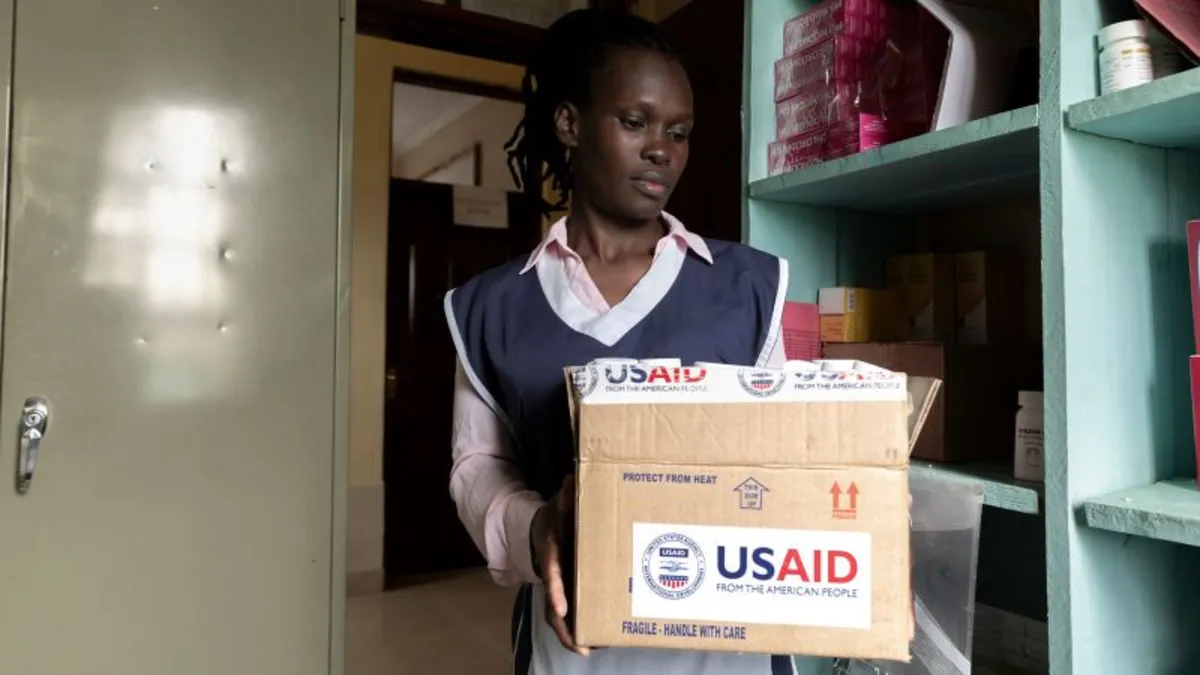
The United States has recently suspended a portion of its funding for the PEPFAR program, officially known as the U.S. President's Emergency Plan for AIDS Relief. This decision has raised alarms among international organizations and members of Congress, who warn that these funding cuts are already impacting patients and jeopardizing crucial projects on a global scale. The full extent of these budget cuts related to U.S.-funded HIV/AIDS relief efforts remains unclear, as Congress continues to grapple with the White House’s proposed budget reductions and the withholding of billions of dollars in vital funding.
PEPFAR has been instrumental in saving over 26 million lives over the past two decades, significantly reducing the number of new HIV infections, especially in Africa. In the previous year, government statistics indicated that PEPFAR provided life-saving antiretroviral therapy to 20.6 million individuals and supported more than 342,000 health workers in delivering essential HIV treatments, prevention care, and support services. This landmark program, established in 2003 during the Bush administration, has primarily been implemented by USAID, which faced significant changes earlier this year when President Donald Trump initiated a freeze on foreign aid.
Following the freeze, the U.S. State Department issued a waiver to exempt life-saving services from the suspension, including those provided by PEPFAR. However, many nonprofits are expressing concern that HIV/AIDS projects have been halted despite this waiver, and the absence of USAID has stalled the implementation of numerous planned initiatives. These funding cuts are severely disrupting medical care for patients across Africa, Asia, and Latin America, posing a serious threat to the global fight against HIV/AIDS.
The UNAIDS agency, dedicated to ending AIDS, has reported several adverse effects resulting from the U.S. funding cuts. These include medicine shortages, staffing reductions at HIV/AIDS clinics, halted community outreach services, and increasing levels of stigma, discrimination, and mortality rates. In particular, countries such as Uganda, the Philippines, and Tanzania have experienced significant disruptions in their HIV responses. Reports from the nonprofit Physicians for Human Rights indicate that individuals living with HIV are skipping or rationing doses of their antiretroviral medications, which can lead to the emergence of drug-resistant strains of HIV.
Doctors Without Borders has raised concerns about the uncertain future of PEPFAR, stating that project cancellations following the dismantling of USAID have already adversely affected humanitarian efforts. Their representative in Zimbabwe, Zahra Zeggani-Bec, emphasized that cuts are crippling the logistical backbone of HIV care. The international Christian organization World Vision also reported the termination of a significant PEPFAR program in Kenya that focused on orphans, vulnerable children, and preventative activities. Chief Impact Officer Margaret Schuler expressed surprise at the termination of what were considered life-saving programs.
The lack of publicly available data regarding PEPFAR's ongoing activities has left many in the dark about the program's current status. A message on the government’s website indicates that it is “undergoing updates,” and future reporting dates for PEPFAR data are listed as “TBD.” A State Department spokesperson noted that data collection is ongoing to reflect recent programming changes. A report from UNAIDS indicated that 28 out of 70 country offices (40%) had witnessed a cessation of community-led services due to the funding cuts, while 21 (30%) reported a halt in services provided by international NGOs.
The absence of clear data on the budget, contracted services, and actual deliverables has raised concerns among experts. Charles Kenny, a senior fellow at the Center for Global Development, remarked that both Congress and taxpayers currently lack visibility into the foreign assistance system's objectives and achievements. Secretary of State Marco Rubio reaffirmed PEPFAR's importance, stating that it will continue to be a life-saving initiative. Additionally, a recent announcement from the State Department revealed a joint commitment with the Global Fund to procure lenacapavir, a new HIV prevention injection, for distribution in high-burden HIV countries.
The ongoing budget battle has further complicated the situation. The White House Office of Management and Budget (OMB) has released only a fraction ($2.9 billion) of the $6 billion appropriated by Congress for PEPFAR’s 2025 funding. Congressional aides have expressed concerns over the categorization of billions in funding as part of fiscal year 2026, which they find unusual. A budget expert indicated that the current PEPFAR apportionment appears irregular compared to previous years. The funds are currently listed as “unallocated” and dependent on a spending plan that must be approved by the OMB and the State Department.
Despite these hurdles, there is still potential for the release of 2025 funding in the near future. The situation remains uncertain, especially following attempts by the Trump administration to claw back $400 million from PEPFAR, a proposal that faced bipartisan opposition in the Senate. Senator Susan Collins highlighted that OMB is obstructing funding for PEPFAR, stating that the program’s funds are not reaching those in need. Meanwhile, Senator Patty Murray criticized OMB Director Russell Vought for restricting funding despite prior assurances to lawmakers.
In a related development, former President Trump recently notified Congress of plans to cancel $4.9 billion in foreign aid already approved for this year. This move has drawn criticism from lawmakers across the political spectrum, with concerns raised regarding the legality of such actions. The U.S. Government Accountability Office has indicated that rescissions made so late in the fiscal year may violate legal guidelines. A recent ruling from a federal judge reinforced that the administration cannot withhold federally budgeted foreign aid without congressional approval.
As the situation develops, the implications of these funding cuts and the ongoing budget battle continue to pose significant challenges for the global fight against HIV/AIDS.